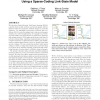Free Online Productivity Tools
i2Speak
i2Symbol
i2OCR
iTex2Img
iWeb2Print
iWeb2Shot
i2Type
iPdf2Split
iPdf2Merge
i2Bopomofo
i2Arabic
i2Style
i2Image
i2PDF
iLatex2Rtf
Sci2ools
MOBIHOC
2015
ACM
2015
ACM
Taming Wireless Fluctuations by Predictive Queuing Using a Sparse-Coding Link-State Model
We introduce State-Informed Link-Layer Queuing (SILQ), a system that models, predicts, and avoids packet delivery failures caused by temporary wireless outages in everyday scenarios. By stabilizing connections in adverse link conditions, SILQ boosts throughput and reduces performance variation for network applications, for example by preventing unnecessary TCP timeouts due to dead zones, elevators, and subway tunnels. SILQ makes predictions in real-time by actively probing links, matching measurements to an overcomplete dictionary of patterns learned offline, and classifying the resulting sparse feature vectors to identify those that precede outages. We use a clustering method called sparse coding to build our data-driven link model, and show that it produces more variation-tolerant predictions than traditional loss-rate, location-based, or Markov chain techniques. We present extensive data collection and field-validation of SILQ in airborne, indoor, and urban scenarios of practical ...
| Added | 14 Apr 2016 |
| Updated | 14 Apr 2016 |
| Type | Journal |
| Year | 2015 |
| Where | MOBIHOC |
| Authors | Stephen J. Tarsa, Marcus Z. Comiter, Michael B. Crouse, Bradley McDanel, H. T. Kung |
Comments (0)

